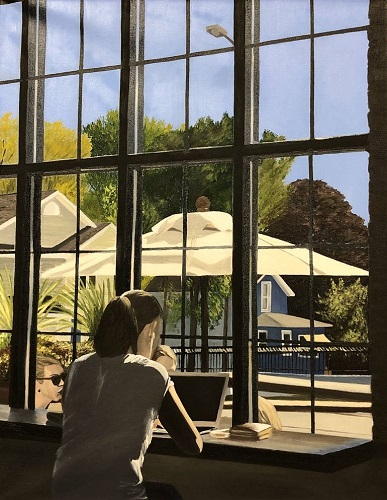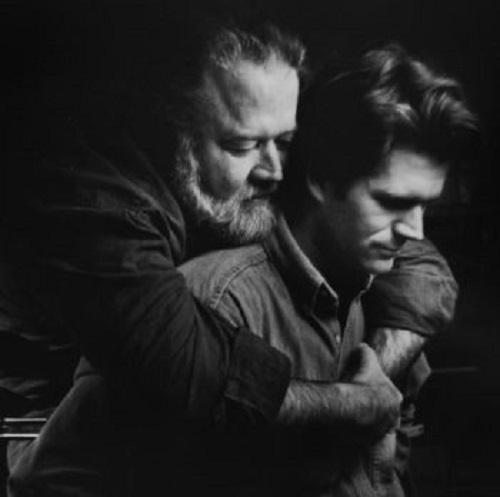Dolce far niente

Heat
Here in the electric dusk your naked lover
tips the glass high and the ice cubes fall against her teeth.
It’s beautiful Susan, her hair sticky with gin,
Our Lady of Wet Glass-Rings on the Album Cover,
streaming with hatred in the heat
as the record falls and the snake-band chords begin
to break like terrible news from the Rolling Stones,
and such a last light—full of spheres and zones.
August,
…………….you’re just an erotic hallucination,
just so much feverishly produced kazoo music,
are you serious?—this large oven impersonating night,
this exhaustion mutilated to resemble passion,
the bogus moon of tenderness and magic
you hold out to each prisoner like a cup of light?

Der Englische Garten in München op een warme zomerdag
De Amerikaanse schrijver en essayist Andre Dubus werd geboren op 11 augustus 1936 in Lake Charles, Louisiana. Zie ook alle tags voor Andre Dubus op dit blog.
Uit: The Cross Country Runner (Voices from The Moon)
“IT’S DIVORCE THAT DID IT, his father had said last night. Those were the first words Richie Stowe remembered when he woke in the summer morning, ten minutes before the six-forty-five that his clock-radio was set for; but the words did not come to him as in memory, as something spoken even in the past of one night, but like other words that so often, in his twelve years, had seemed to wait above his sleeping face so that when he first opened his eyes he would see them like a banner predicting his day: Today is the math test; Howie is going to get you after school…. It’s divorce that did it, and he turned off the switch so the radio wouldn’t start, and lay in the breeze of the oscillating fan, a lean suntanned boy in under-pants, neither tall nor short, and felt the opening of wounds he had believed were healed, felt again the deep and helpless sorrow, and the anger too because he was twelve and too young for it and had done nothing at all to cause it. Then he got up, dressed in jeans and tee shirt and running shoes, went to his bathroom where a poster of Jim Rice hung behind the toilet, gazed at it while he urinated, studying the strong thighs and arms (in the poster Rice had swung his bat, and was looking up and toward left field), and Richie saw again that moment when Rice had broken his bat without hit-ting the ball: had checked his swing, and the bat had continued its forward motion, flown out toward first base, leaving Rice holding the handle. This was on television, and Richie had not believed what he had seen until he saw it again, the replay in slow motion. His bicycle was in his room. He pushed it down the hall, at whose end, opposite his room, was the closed door leading to his father’s bathroom and bedroom. He went out the front door and off the slab of concrete in front of it, mounted, and rode down the blacktop street under a long arch of the green branches of trees. As he pedaled and shifted gears he prayed for his anger to leave him, and for his brother Larry, and Brenda, and his father, but as he prayed he saw them: Larry and Brenda when they were married, sitting at the kitchen table with him and his father, Brenda’s dark skin darker still from summer, her black hair separating at her shoulders, so that some of it rested on the bare flesh above her breasts. The men were watching her: slender and graceful Larry, who acted and danced, his taut face of angles and edges at the jaw and cheekbones, and a point at the nose; and Richie’s father, with Larry’s body twenty-two years older, wiry and quick, the face not rounded but softened over the bones. Then he was at the church, and he locked his bicycle to a utility pole in front of it and went in, early for the seven o’clock Mass, genuflected then kneeled in an empty pew, and gazed at the crucifix, at the suffering head of Christ, but could not stop seeing what he had not seen last night but imagined as he lay in bed while his father and Larry sat and stood and paced on his ceiling, the floor of the living room. He shut his eyes, saw Larry’s blanched face looking at his father, and saying Marry her? Marry her? and saw his father and Brenda naked in her bed in the apartment she had lived in since the divorce, saw them as he had seen lovemaking in movies, his father on top and Brenda’s dark face, her moans, her cries, seeming more in pain than pleasure.”

Andre Dubus en zijn zoon Andre Dubus III
De Duitse dichter en schrijver Wolf Wondratschek werd geboren op 14 augustus 1943 in Rudolstadt. Zie ook alle tags voor Wolf Wondratscheck op dit blog.
Eindpunt
Ik stond bij de bushalte
te wachten;
en toen de bus kwam, stapte ik in
en stond weer te wachten.
Voor me hield een meisje zich bezig met haar vrijer
en omdat ik niks had te doen, keek ik toe
hoe ze om zijn nek hing en soms achterom
keek naar mij, die vooruit keek naar haar.
Ik stond in de bus,
balanseerde op mijn benen de straten door
en dacht helemaal nergens aan;
op een gegeven moment stapte ik uit, ging naar huis
en dacht
‘Er is niets wat een man eenzamer maakt
dan het zachtjes lachen in het oor van een ander.’
Vertaald door S. Lapinski en Martin Reints

Zie voor nog meer schrijvers ook mijn blog van 11 augustus 2023 en ook mijn blog van 11 augustus 2021 en ook mijn blog van 11 augustus 2019 en eveneens mijn blog van 11 augustus 2016 en ook mijn blog van 11 augustus 2011 deel 2.
